Removable Silicone Dentures
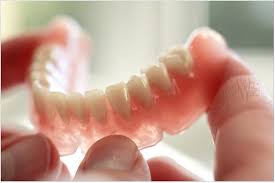
Silicone removable dentures are various flexible designs that are used for both full and partial dentures.
Currently, silicone prosthetics is one of the most popular methods of tooth restoration, although it should be noted that the term "silicone" prosthesis is not entirely correct.
The concept of "silicone prosthesis" applies to structures made of nylon, silicone, acrylic and, in part, to plastic prostheses.
Removable dentures have a silicone soft base and retainers. The remaining details of the structure (for example, teeth) are made, most often, of plastic.
Silicone prosthetics, like any other, can have its advantages and disadvantages.
Therefore, before making the final choice in favor of the design, you must carefully weigh the pros and cons.
Benefits
The advantages of silicone prostheses include:
- The presence of high elasticity of the structure, which does not cause discomfort when using it.
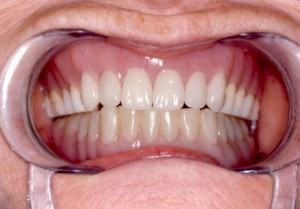
Photo: Removable silicone upper and lower jaw designs - Perfect reproduction of the configuration of the sky, due to which the prosthesis fits perfectly to the gums, which accelerates the process of getting used to the sensation of the presence of a foreign body in the oral cavity.
- The prosthesis is firmly fixed in the mouth, which prevents it from falling out during chewing of food.
- Silicone constructions are made of hypoallergenic material, which is important for those patients who are allergic to acrylic plastic or metal.
- Product strength and rational distribution of chewing load on the jaw when chewing.
- No turning of the supporting teeth is required to fix the structure. This is an important factor that allows the patient to keep his teeth.
- High esthetic properties. Silicone prosthesis is almost invisible in the mouth, because fixatives are made to match the color of the oral mucosa or the shade of natural teeth.
- Silicone is not stained with food colors and maintains its original color for a long time due to the lack of hygroscopicity and uniformity of the base material.
- Designs lack stiffness and metal elements that can damage the gums and abutment teeth or cause them to loosen.
- Silicone products are almost impossible to break.
- Ease and simplicity of prosthesis care.
disadvantages
FROMremovable dental prosthetics made of silicone has some disadvantages:
- Products do not withstand high chewing loads. Therefore, experts do not recommend the use of silicone prostheses with full prosthetics, especially the lower jaw.
- High requirements for cleaning products.Inadequate hygiene and the use of unsuitable care products can cause an unpleasant odor and discoloration of the structure.
- Clammed prosthesis fixation can injure the mucous membrane and cause sagging gums.
- At prosthetics of several teeth or the whole jaw, atrophy of bone tissue and its destruction associated with friction and increased pressure of the structure on the mucosa and the development of the inflammatory process are not excluded.
- Due to the subsidence of the gum tissue, regular correction is required, up to a design change. Prosthetics of one or two teeth do not require frequent adjustments.
- Poor polishability of the product, causing the accumulation of bacterial plaque on its surface. As a result, a hard coating forms on the surface of the prosthesis, and the structure becomes unpleasant. To clean the structure from plaque, you must contact the dental clinic.
- Silicone dentures are quite expensive removable designs. Their cost, in comparison with plastic products, is several times higher.
The presence of the listed disadvantages of silicone prostheses makes their use limited.
Given the high cost of silicone, the presence of obvious flaws, forces dentists to opt for cheaper materials.
If it is necessary to restore one or two teeth, the existing disadvantages can be neglected.
Video: “Nylon prosthesis. Advantages and disadvantages"
Indications
Silicone constructions are installed for patients who, due to some circumstances, are not able to perform fixed prosthetics.
These circumstances include:
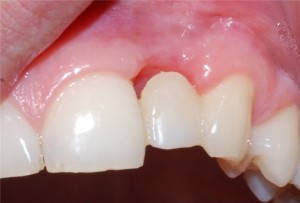
- The presence of cardiovascular disease.
- Diabetes mellitus.
- The presence of allergies to various materials and drugs.
- Bronchial asthma.
- Epileptic seizures.
- As temporary structures after implantation during the manufacture of a permanent denture.
- The presence of traumatic professions.
- Periodontitis, periodontal disease.
- Restoring missing teeth in children.
Contraindications
The use of silicone structures is not recommended if:
- Severe atrophy of the alveolar process.
- Periodontal disease of III and IV degrees, gingivitis, periodontitis with exposure of the root of the tooth.
- Pathology of the development of the crown of the supporting teeth.
- Different in height level of the edge of the gums of the supporting teeth.
- Low levels of atrophied gums.
Prosthetics Steps
Dental prosthetics with removable silicone structures consists of two stages: clinical and laboratory.
Clinical stage
- At the preparatory stage, dental treatment is carried out, dental deposits are removed, if necessary, the teeth are whitened. With the help of a dentist, a suitable model is selected for the patient.
- Impressions of the teeth are made using a special spoon and plastic mass, which the doctor passes to the dental laboratory.
Laboratory stage
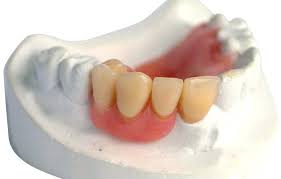
- The layout of the jaw is made. A dental technician casts a plaster model of a future design.
- Defining the boundaries of the structure.
- Modeling.
- Plastering
- The material is placed in temopress.
- Processing the finished product with cutters, fillets, brushes, followed by polishing.
Cost
The price of silicone structures is quite high, given all its shortcomings.
The cost of construction is affected by the quality of the silicone and the number of teeth restored.
The price of structures made of high-quality silicone in different clinics of the country ranges from 30-35000 rubles.
The cost of the prosthesis can be reduced through the use of cheaper silicone, but no self-respecting dentist will not guarantee the quality of such a design.
| Type of prosthesis | Price, rub.) |
| Silicone construction on the upper or lower jaw | from 30000 |
| Partial Silicone Denture | from 20,000 |
| Design for 1-2 teeth made of silicone | from 15000 |
| Acrylic all-jaw prosthesis | from 8000 |
| Partial Acrylic Denture | from 3000 |
| Nylon full jaw tooth structure | from 25000 |
| Clasp prosthesis | from 18000 |
Reviews
- Set a partial silicone prosthesis on the front teeth. I have been using it for two years now. The design, in principle, is not bad. I didn’t get used to it for long. True, you have to make nutrition restrictions: you have to grind solid food. The disadvantage of the prosthesis is that it is demanding for care.
- I have been using a silicone prosthesis for a year and a half. I installed a removable structure because I did not want to grind the abutment teeth. It does not suit me in them that they are very painful to chew.
- I got a silicone denture on my upper jaw. I got used to it for a long time. Over time, there was an unpleasant odor from the structure. The dentist said that special care products should be used. The design itself is not cheap, and even have to spend money on the purchase of cleaning products.
- A month ago, I had a silicone prosthesis on two front teeth. Friends do not even notice that the teeth are not real. Chewing is very uncomfortable. But I use the prosthesis for only a month, i.e. I’m still at the stage of getting used to, so it’s too early to draw conclusions.
Photo: before and after
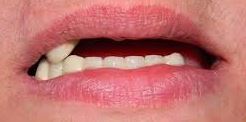 |
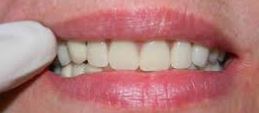 |
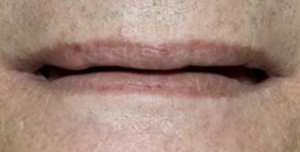 |
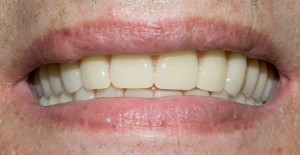 |
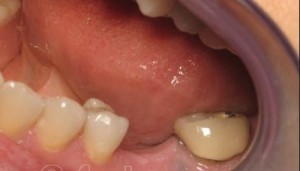 |
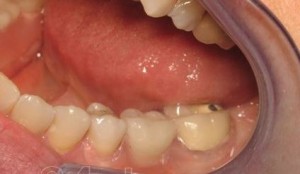 |